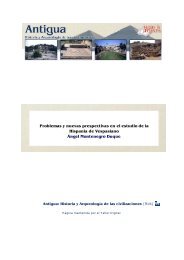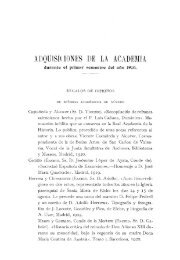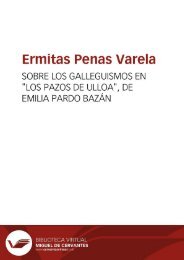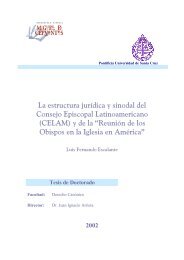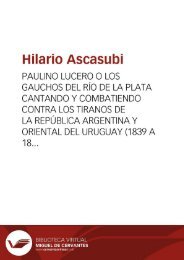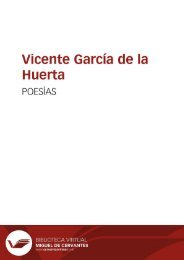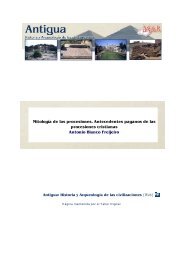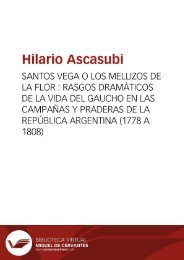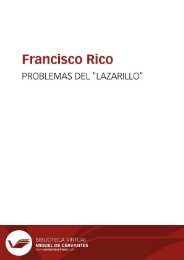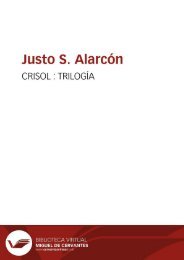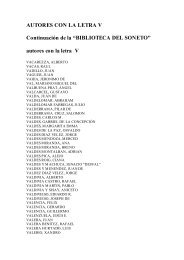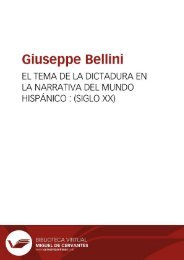Create successful ePaper yourself
Turn your PDF publications into a flip-book with our unique Google optimized e-Paper software.
Anales galdosianos [Publicaciones periódicas]. Año XII, 1977<br />
The work in its entirety is a study of the influence of the individual on his milieu and of it upon<br />
him. Earlier critical approaches sometimes brought to the work an a priori belief that the undeniable<br />
Krausist ideas expressed in El amigo Manso required a positive reading. Such approaches are now<br />
being tempered by interpretations in keeping with <strong>Galdós</strong>' hope and charity, without requiring him<br />
to have faith 115 . Imagination, the ever-present « loca de la casa » in his works, never triumphs.<br />
The other novels that deal with change in the individual and in society -and on the highest level this<br />
may be the prevailing theme of all his work- are pessimistic. El amigo Manso is no exception, nor<br />
is the author subtle about the matter. In the first chapter Manso claims to be the « humilde auxiliar<br />
de esa falange de nobles artífices que siglo tras siglo han venido tallando en el bloque de la bestia<br />
humana la hermosa figura del hombre divino » (12), but he admits that « la penetración activa, la<br />
audacia fecunda, la fuerza potente y creadora, me están vedadas como a los demás mortales de mi<br />
tiempo » (12; underlining ours). Later he states categorically that « es ley que el mundo sea nuestro<br />
molde y no nuestra hechura » (69) 116 . And finally, in the last chapter, his existence concluded, he<br />
finds that « de cuánto escribí y enseñé apenas quedan huellas » (224). In the case of Manuel, «<br />
115 Useful representative studies, from differing vantage points, are those of Ricardo Gullón, op.<br />
cit. ; José F. Montesinos, <strong>Galdós</strong> , II (Madrid: Editorial Castalia, 1969); and Denah Lida, « Sobre el<br />
krausismo de <strong>Galdós</strong> », in Anales Galdosianos , II (1967), 1-27.<br />
116 These words express the central theme of the novel, one of contemporary man's most disturbing<br />
perceptions. B. F. Skinner, in his Beyond Freedom and Dignity (Bantam Books: New York, 1972) -<br />
one of many elaborations that might be cited- states categorically that «a person does not act upon the<br />
world, the world acts upon him». (202). Ernest Jones explains Freud's comparable view in The Life<br />
and Work of Sigmund Freud (New York: Basic Books, 1955) as the result of three scientific blows to<br />
mankind's narcissism -those of three revolutions: the cosmological of Copernicus, the biological of<br />
Darwin and the psychological of Freud. (II, 225-26). <strong>Galdós</strong>, clearly responding elsewhere in his work<br />
to the first two and markedly pre-Freudian in his best work, is nevertheless, in Manso , concerned with<br />
a social rather than a scientific perception. Karl Marx' view that «it is not the consciousness of men that<br />
determines their being, but, on the contrary, their social existence determines their consciousness» ( A<br />
Contribution to the Critique of Political Economy [1859], reproduced in Karl Marx and Friedrich<br />
Engels, Basic Writings on Politics and Philosophy, ed. L. S. Feuer, [Garden City: Doubleday, 1959], p.<br />
43.) is not far removed from the statement made by El amigo Manso , one of the early overt treatments<br />
of the theme.<br />
84




